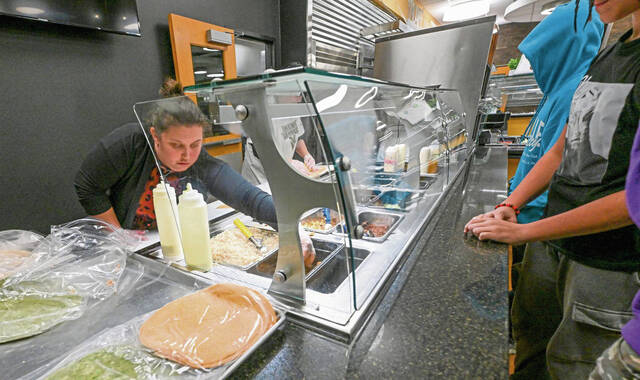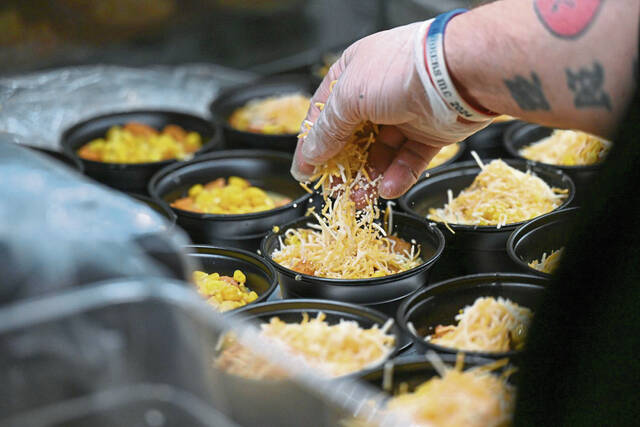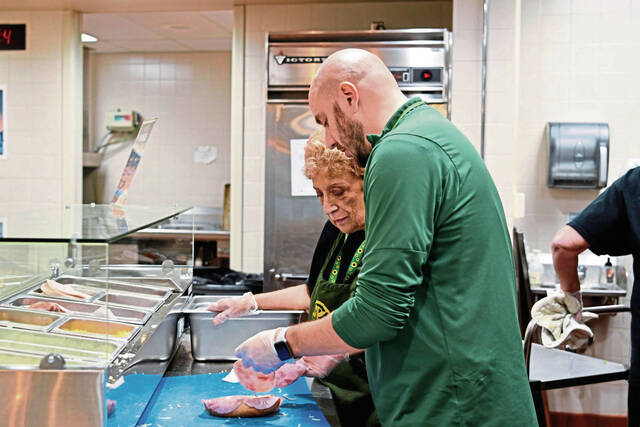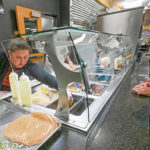A pair of state lawmakers are advocating to again provide universal free lunches to students in the coming school year, though nobody knows for sure how much it would cost.
State Sen. Lindsey Williams, D-North Hills, and Sen. Judy Schwank, D-Berks, will reintroduce the Universal School Meals legislation, aimed at fighting child hunger, in the spring.
The program would apply to all schools that participate in the National School Lunch and School Breakfast programs, not just public schools.
A representative from Williams’ office said that, because the cost is tied to federal reimbursements, a team is working to finalize a new cost estimate for this year that would reflect updated formulas. It will be released when the estimate is completed, she said.
A similar proposal in 2023 failed to make it to the governor’s desk. At that time, Williams told TribLive news partner WTAE that universal school lunches could cost the state up to $300 million per year — about 1% of the state’s budget at that time.
During the pandemic, the state provided free school meals, breakfast and lunch, to all students through the use of federal covid emergency funding. The universal free lunches ended when the federal money ran out.
This year, the free lunch proposal is gaining support from superintendents — even in districts where meals already are dished up at no cost.
“It’s hard to learn when you’re more worried about having something to eat,” New Ken-Arnold Superintendent Christopher Sefcheck said. “Students need to have a well-balanced diet both in and out of school.”
His district has been offering free meals for several years under the federal Community Eligibility Provision program, and Sefcheck said it benefits students without a doubt. Generally, the program allows schools to offer free lunches to all students regardless of income if overall family income in the district averages below federal guidelines to qualify for free meals.
“I’m sure other schools could benefit by this (new) proposal,” Sefcheck said.
Right now, students at the state’s public schools qualify for free meals if their family income is 130% of the poverty level. That’s $40,560 or less for a family of four, according to the state.
Hempfield Area School District Superintendent Mark Holtzman believes the program would be impactful. His district doesn’t currently offer free lunches for students except those who qualify under federal guidelines.
“It would be a huge advantage for our families to not have to worry about the cost of lunch,” he said.
First, the bill would need to pass through the Democrat-controlled state House before getting to the Republican-majority Senate.
If signed by Gov. Josh Shapiro, it would expand the state’s current no-cost breakfast program signed into law in late 2022 by then-Gov. Tom Wolf.
Working on support
So far, Williams and Schwank have attracted 10 co-sponsors for their proposal — all Democrats. They include Jay Costa, whose district includes Oakmont, Verona and Penn Hills, and Wayne Fontana, whose district includes Millvale, Emsworth and Scott.
Others across the state include Democrats Maria Collett, Carolyn Comitta, Art Haywood, Vincent Hughes, John Kane, Nikil Saval, Sharif Street and Christine Tartaglione.
Republican state Rep. Abby Major, whose district includes parts of Armstrong and Westmoreland counties, said she is happy to read through the proposal and “see if it’s something I can get behind.”
In the Senate, Republican President Pro Tempore Kim Ward did not respond to requests for comment.
Republican Senate Majority Leader Joe Pittman did not address the free lunch issue but said Senate Republicans are committed to supporting public education.
“Throughout the last legislative session, Senate Republicans advanced numerous initiatives to expand educational opportunities and dedicate record-breaking levels of funding for our students. During this session we will continue to examine ways to best support students in their learning environments, while also placing a significant value on empowering parents when it comes to the education and well-being of their children.”
In Pennsylvania, 1 in 8 kids goes hungry, according to the nonprofit Universal School Meals PA Coalition. In rural areas, the number is as high as 1 in 5.
Williams said her legislation would connect kids to healthy foods every day so they can learn and succeed in school, and would remove stigma from not being able to afford lunch.
“Parents, teachers and students talk to me all the time about how much they love the breakfast program,” she said. “Expanding the program to include lunch will help parents and families even more, especially with grocery costs climbing. No kid should go hungry at school.”
Free meals impact nutrition; enhance child development and school readiness; support learning, attendance and behavior; and contribute to positive mental health outcomes, according to the School Nutrition Association of PA.
Deer Lakes Superintendent Janell Logue-Belden said the bill would remove hurdles for all children.
“The wellness of every child begins with ensuring their basic needs are met regardless of their family’s financial situation,” she said. “Providing students school meals free of charge is a step toward ensuring their nutritional needs are met so that they get the most out of their educational experiences without worrying about the cost of a nutritious meal.”
Economic impact
Eight states offer universal free lunches: California, Colorado, Maine, Massachusetts, Michigan, Minnesota, New Mexico and Vermont.
Williams said her office will be working with the state Department of Education to hone the legislation in coming months.
Dave Keibler, Leechburg Area School District superintendent, said the free lunch program, offered in his schools the past two years, has helped families of all income levels.
It reduces grocery bills for families and helps drive down household costs.
A Wharton School study found that feeding kids at school impacts the whole community. It causes lower grocery demand, which leads to lower prices.
Big chain stores saw grocery sales decrease by 10% in areas where students receive no-cost meals, and lower food costs by 2.5%, according to the study.
“Free lunches for all public school students would be a tremendous asset to families struggling with prices in our current economy,” Keibler said.
Nicole Melia, public policy and legislative chair for the School Nutrition Association of PA, said school meals are as essential to education as technology, transportation and textbooks.
“Hungry kids can’t learn,” Melia said.















